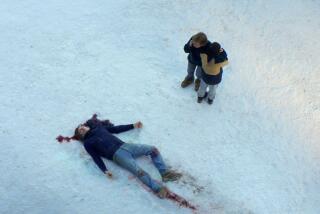WRITING UNSPOKEN LINES
- Share via
New York — IN “Notes on a Scandal,” a teacher named Barbara (Judi Dench) spies a colleague (Cate Blanchett) having a sexual encounter with a teenage student.
“We don’t see very much of what they’re doing,” said Philip Glass, 69, the film’s composer. “What we do see is the shock and disgust and horror in Barbara’s face.”
First, Glass scored the scene with turbulence. “I tried that, and it turned into a burlesque -- very vulgar,” he said. And then he realized the scene “had to do with something Barbara was experiencing. Not what they were experiencing.”
Discussions with director Richard Eyre and Scott Rudin, one of the producers (“He loves to talk about things like this”), influenced how music would describe Blanchett’s affair.
“Was it just a sexual encounter?” they asked. Or “a grab at youth and vitality?”
Glass’ score for the similarly dramatic “The Hours” was famously clarion, speedy, almost overwhelming. But here, he said, “in emotional scenes, the music gets slower rather than faster.” There are quick repeated, modulated phrases -- but, with the melodic interplay of oboe and horn, it is narrative music.
“This does not sound like ‘The Hours,’ and does not sound like ‘Kundun,’ ” he said of the 1997 Martin Scorsese film he scored.
“Notes,” which will be released at Christmas, is set in London. There’s something a little Hogwarts -- grave and English and romantic -- to the music.
Glass also provided original music for this year’s “The Illusionist,” with Edward Norton. He’s comfortable scoring two films a year, he said, but don’t ask him for more. “By Hollywood standards, I’m a bit of an amateur,” he said. “I’ll never catch up with Elmer Bernstein. Who’s dead, of course.”
The “Notes” score was revised three times, though Glass takes it all in stride. “The process of editing the film is where the director begins to understand how the film works,” he said. So when a scored scene is cut a bit, there’s a solution for the music -- the tempo can be shifted up just a touch without altering pitch or quality.
“To lose 10 seconds is easy. The computer can divide time infinitely, it seems. It’s just numbers,” he said at the offices of his music publisher, Dunvagen. He does not keep an office of his own, writes scores in pencil and orchestrates them himself, he said.
Glass is now finishing work on Stephen Hopkins’ “The Reaping,” starring Hilary Swank; preparing a Civil War opera for San Francisco Lyric Opera; and collaborating with Leonard Cohen.
More to Read
Only good movies
Get the Indie Focus newsletter, Mark Olsen's weekly guide to the world of cinema.
You may occasionally receive promotional content from the Los Angeles Times.










